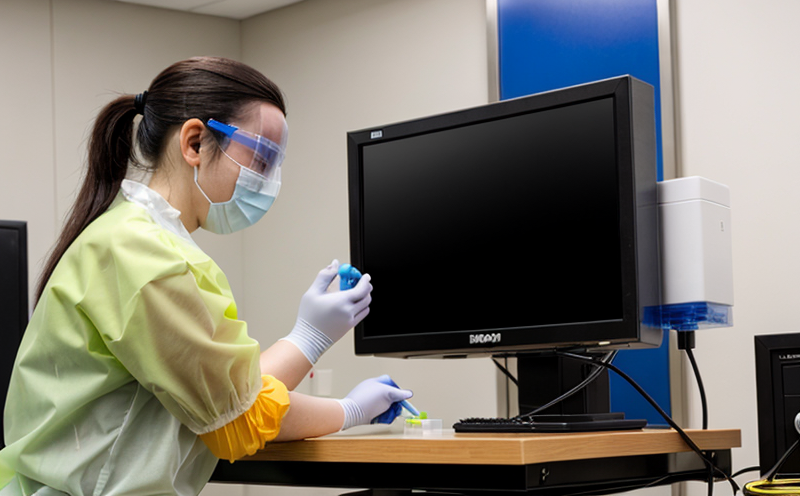In Vitro Cell Adhesion Testing for Implant Materials
Biocompatibility testing is a critical aspect of ensuring that medical devices are safe and effective when implanted in the human body. Among various biocompatibility tests, In Vitro Cell Adhesion Testing (IVCA) plays a pivotal role by assessing how well cell cultures adhere to implant materials. This test helps determine if the material can support biological processes without causing adverse effects.
The process involves culturing cells on the surface of the implant material and observing their ability to attach, spread, and proliferate. The success or failure of this adhesion is indicative of the material's biocompatibility. Failure in cell adhesion could lead to migration of cells away from the implant site, which might compromise healing processes.
Materials commonly tested include titanium alloys, stainless steel, cobalt-chromium alloys, and various polymers used in orthopedic devices like hip replacements or spinal implants. The results of this test are crucial for regulatory compliance and ensuring product safety before clinical use.
The technique is also beneficial in the early stages of product development to identify potential issues with new materials or design changes that could impact biocompatibility. By conducting IVCA tests, manufacturers can make informed decisions about material selection and processing methods, thereby reducing the risk of costly failures during later phases of development.
The testing process typically starts by selecting appropriate cell lines relevant to the intended use of the implant. Commonly used cells include osteoblasts for bone implants or fibroblasts for soft tissue applications. Once the cells are prepared, they are seeded onto the surface of the material and incubated under controlled conditions.
During this period, the behavior of the cells is monitored using microscopic techniques such as scanning electron microscopy (SEM) to observe cell morphology and adhesion patterns. Additionally, quantitative measures like the percentage of attached cells or the rate of proliferation can provide valuable insights into material performance.
The test results are compared against predefined criteria established by relevant standards such as ASTM F1723-09a for metallic implants. Compliance with these standards ensures that the product meets industry requirements and is suitable for clinical use.
In summary, In Vitro Cell Adhesion Testing is an essential step in ensuring the biocompatibility of implant materials. It provides critical information regarding how well cells interact with the material surface, which directly impacts the success of the device's function and safety.
Applied Standards
- ASTM F1723-09a: Standard Practice for In Vitro Cell Adhesion Testing of Metallic Implants
- ISO 10993-4: Biological Evaluation of Medical Devices -- Part 4: Selection and Use of Tests
The application of these standards ensures uniformity in testing protocols, thereby facilitating comparability of results across different studies and products. These guidelines provide a framework for selecting appropriate cell lines, defining test conditions, and interpreting outcomes.
ASTM F1723-09a specifically outlines the procedure for conducting IVCA tests on metallic implants, including sample preparation, incubation times, and evaluation methods. The standard emphasizes the importance of using validated protocols to ensure reliable and reproducible results.
ISO 10993-4 provides broader guidance on biological testing for medical devices, recommending the use of IVCA as one method among several other tests. This international standard helps manufacturers understand how best to integrate IVCA into their overall biocompatibility evaluation strategy.
Industry Applications
In Vitro Cell Adhesion Testing is widely utilized in the medical device industry, particularly for orthopedic and dental implants. Orthopedists often rely on this testing to ensure that bone screws or plates they use will integrate well with human bones. Similarly, dentists may look at how well crowns or bridges adhere to tooth structures.
The test is also valuable in the cardiovascular field where stents are used to support blood vessels. By ensuring good adhesion between the stent and vessel walls, these tests help prevent complications such as migration of the device or excessive inflammation around it.
Additionally, IVCA testing supports the development of minimally invasive devices like catheters or intravenous lines, where adherence ensures effective delivery of treatments without causing irritation to surrounding tissues. The results from this test are integral in gaining regulatory approvals and ensuring product quality throughout the supply chain.
Environmental and Sustainability Contributions
- Reduced waste through optimized material design
- Promotion of sustainable practices by improving first-pass success rates in manufacturing
- Increase in recycling potential due to better understanding of biocompatibility issues early in the product lifecycle
The results from In Vitro Cell Adhesion Testing contribute significantly to environmental sustainability. By identifying problematic materials early, manufacturers can avoid costly post-market recalls and improve the overall quality of their products. This leads to reduced waste generation as defective products are identified earlier in production.
Furthermore, sustainable practices are enhanced when manufacturers can achieve first-pass success rates through effective testing protocols. This not only reduces material usage but also minimizes energy consumption associated with reprocessing or replacing failed components.
The improved understanding of biocompatibility issues early in the product lifecycle allows for more efficient recycling processes. As medical devices become increasingly recyclable, the environmental footprint is reduced, contributing positively to sustainability goals within the industry and beyond.





